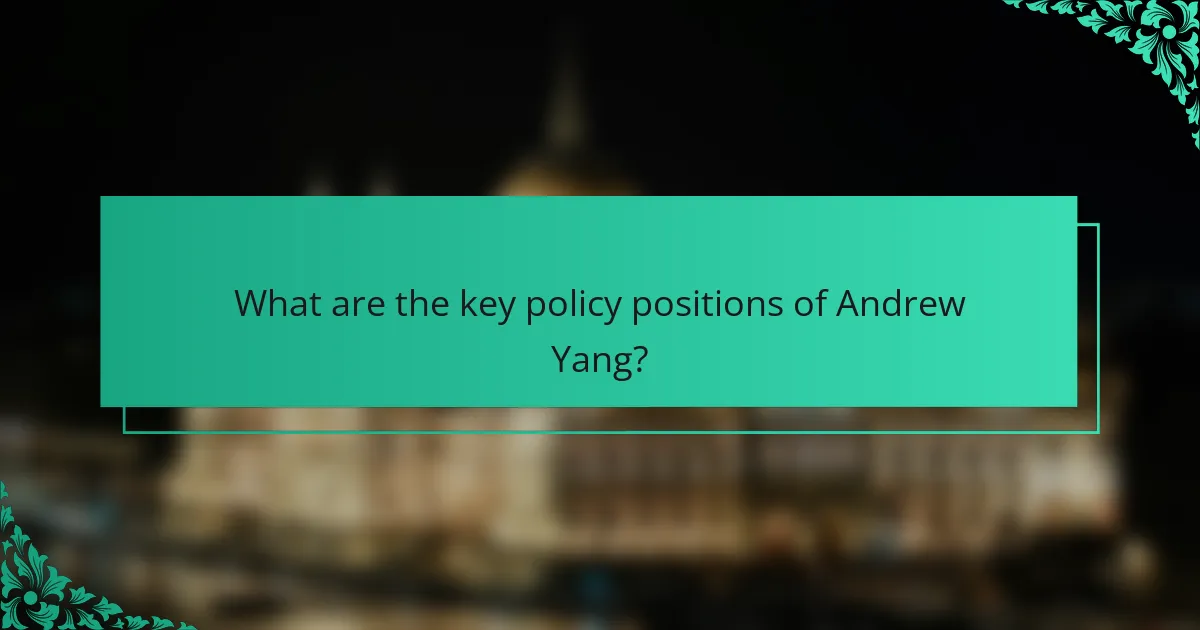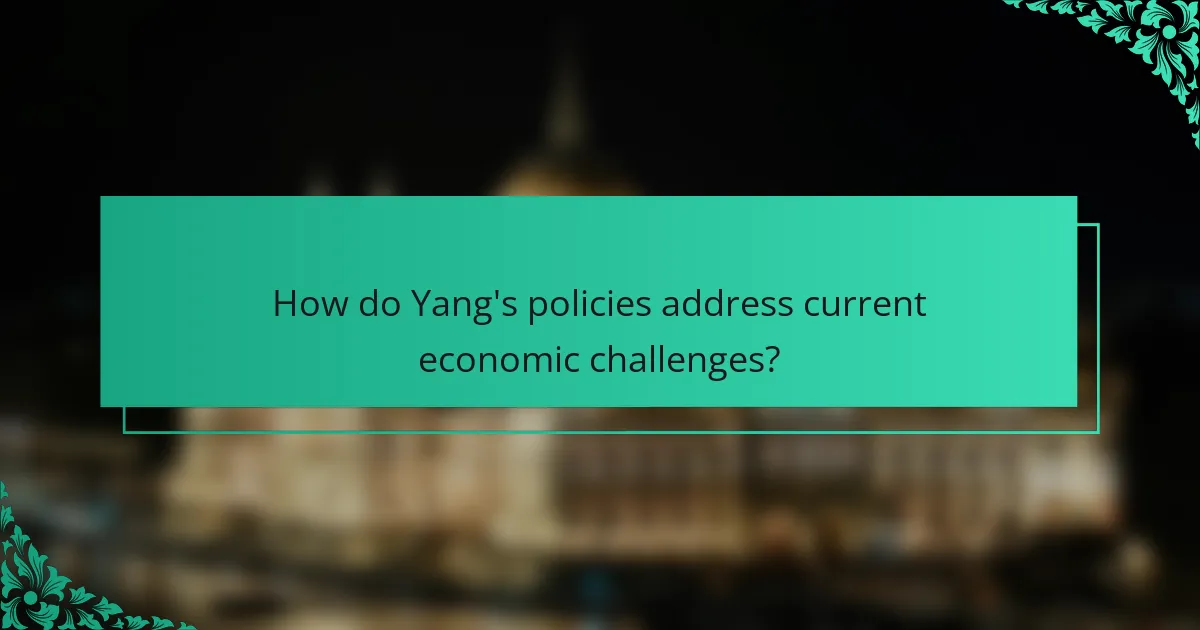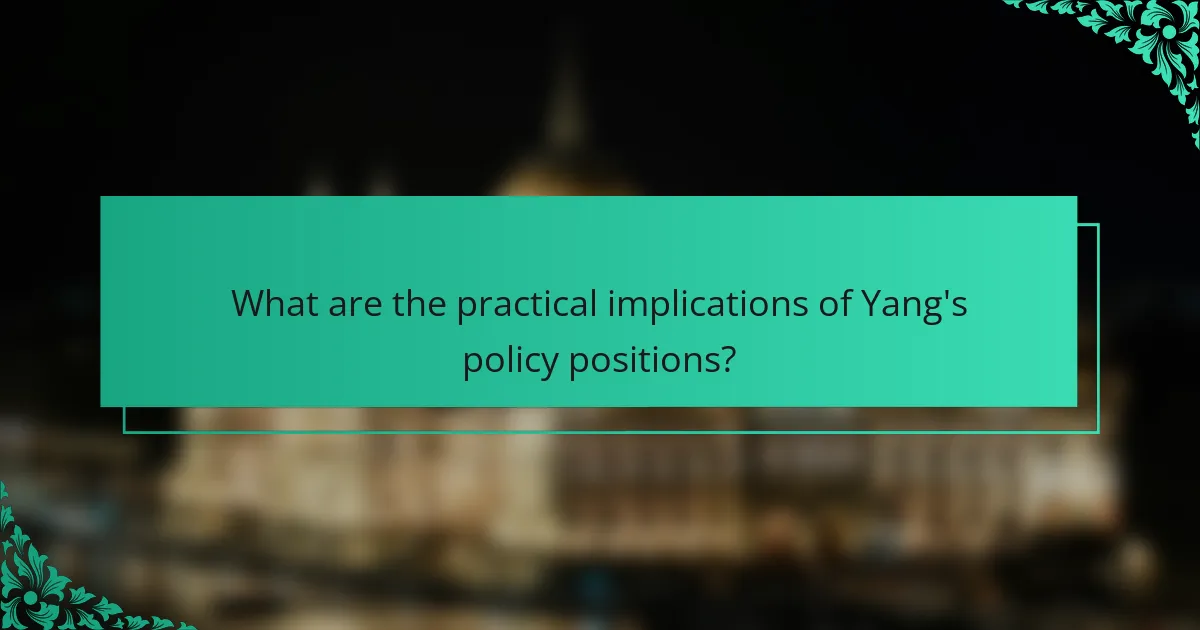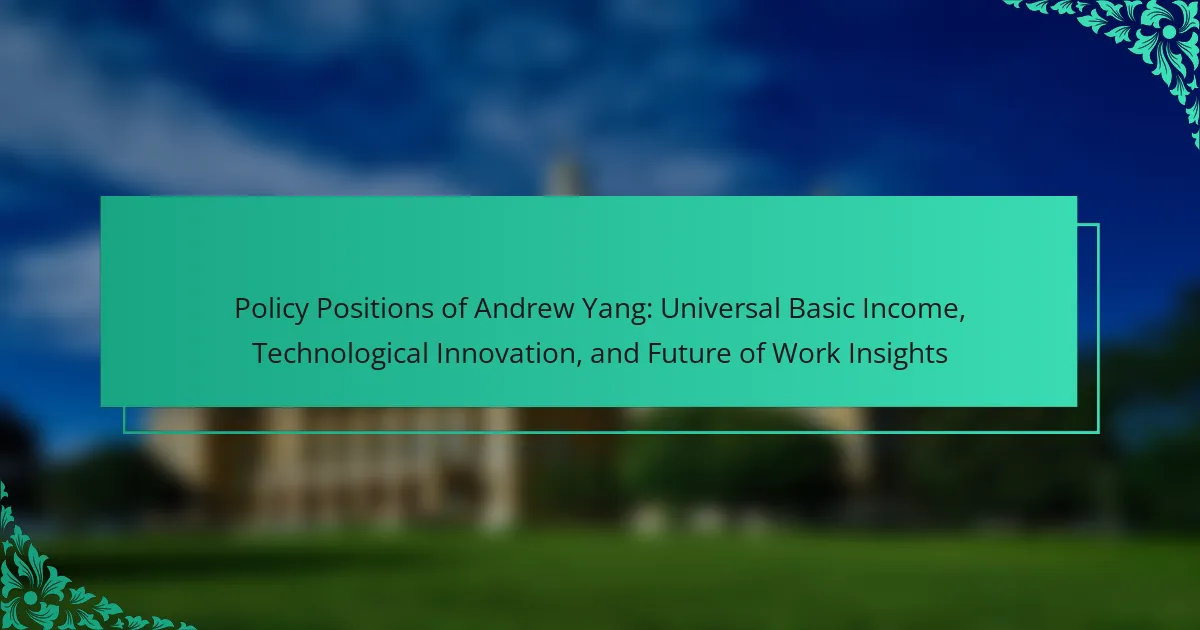The article focuses on Andrew Yang’s key policy positions, which include Universal Basic Income (UBI), technological innovation, and strategies for addressing the future of work. Yang’s UBI proposal aims to provide a monthly payment of $1,000 to all citizens, targeting poverty alleviation and income inequality. He emphasizes the necessity of preparing for job displacement caused by automation through investment in technology and education, advocating for retraining programs to equip workers for new roles. Additionally, Yang supports healthcare reform to ensure accessible services for everyone, promoting economic security and adaptability in a rapidly evolving job landscape. This overview highlights Yang’s commitment to addressing the challenges posed by technological advancements and fostering a more resilient economy.

What are the key policy positions of Andrew Yang?
Andrew Yang’s key policy positions include Universal Basic Income (UBI), technological innovation, and addressing the future of work. UBI proposes a monthly payment of $1,000 to all citizens to alleviate poverty. Yang emphasizes the importance of preparing for job displacement due to automation. He advocates for investing in technology and education to create new job opportunities. Yang also supports healthcare reform to ensure access for all. His policies aim to promote economic security and adaptability in a changing job landscape. These positions reflect his commitment to addressing the challenges posed by technological advancements.
How does Andrew Yang define Universal Basic Income?
Andrew Yang defines Universal Basic Income (UBI) as a program that provides all citizens with a regular, unconditional cash payment. This payment is intended to ensure a basic level of financial security. Yang advocates for a monthly payment of $1,000 to every [censured]. He believes UBI can alleviate poverty and stimulate the economy. Yang argues that UBI addresses job displacement caused by automation. He cites studies showing that UBI can improve mental health and reduce crime rates. Yang’s proposal aims to empower individuals and foster entrepreneurship. His vision for UBI is rooted in the belief that everyone deserves a financial safety net.
What are the main goals of Universal Basic Income according to Yang?
The main goals of Universal Basic Income (UBI) according to Andrew Yang are to alleviate poverty and provide financial security. UBI aims to ensure that every citizen receives a regular, unconditional payment. This payment is intended to cover basic living expenses. Yang argues that UBI would stimulate the economy by increasing consumer spending. Additionally, it would help individuals adapt to job displacement caused by automation. By providing a safety net, UBI can promote entrepreneurship and innovation. Yang believes that UBI can reduce stress and improve mental health for recipients. These goals align with Yang’s vision for a more equitable society.
How would Universal Basic Income be funded?
Universal Basic Income (UBI) could be funded through various mechanisms. One proposed method is a value-added tax (VAT) on goods and services. This tax could generate significant revenue, similar to models in European countries. Another funding source is reallocating existing welfare programs, streamlining government spending. Andrew Yang suggested utilizing revenue from technology companies benefiting from automation, such as a tax on their profits. Additionally, carbon taxes could provide funding while addressing climate change. Studies indicate that these methods could collectively support a sustainable UBI system. Implementing these strategies could ensure the financial viability of Universal Basic Income.
What role does technological innovation play in Yang’s policy positions?
Technological innovation is central to Andrew Yang’s policy positions. He advocates for policies that address the impact of automation on jobs. Yang emphasizes the need for a Universal Basic Income (UBI) as a response to job displacement caused by technology. He argues that technological advancements lead to increased productivity but also threaten traditional employment. Yang believes that embracing innovation can create new job opportunities while necessitating a safety net for those affected. His proposals aim to harness technology for economic growth while ensuring equitable distribution of its benefits.
How does Yang envision the impact of automation on jobs?
Yang envisions automation significantly disrupting the job market. He believes that many jobs will be replaced by machines. This transition could lead to widespread unemployment. Yang emphasizes the need for solutions like Universal Basic Income (UBI) to address this issue. He argues that UBI can provide financial security during job displacement. Yang cites studies predicting millions of jobs could be lost due to automation. He highlights the importance of preparing the workforce for new types of employment. Yang advocates for retraining programs to help workers adapt to technological changes.
What solutions does Yang propose to address technological unemployment?
Andrew Yang proposes several solutions to address technological unemployment. One key solution is Universal Basic Income (UBI), which provides a monthly payment to all citizens. This financial support aims to alleviate the economic impact of job displacement due to automation. Yang suggests that UBI can help individuals transition to new employment opportunities.
Additionally, Yang advocates for retraining programs. These programs would equip workers with skills relevant to the changing job market. He emphasizes the need for government investment in education and vocational training. This approach seeks to prepare the workforce for emerging industries.
Yang also highlights the importance of fostering innovation. He believes that supporting new technologies can create new job opportunities. By investing in startups and tech development, the economy can adapt to changes in the labor landscape.
Overall, Yang’s solutions focus on providing financial security, retraining workers, and promoting innovation to combat technological unemployment.
What insights does Yang offer on the future of work?
Andrew Yang emphasizes that the future of work will be heavily influenced by automation and artificial intelligence. He predicts significant job displacement due to technological advancements. Yang advocates for Universal Basic Income (UBI) as a solution to support those affected. He asserts that UBI can provide financial stability in a changing job market. Yang also highlights the importance of reskilling and education to adapt to new job demands. He believes that society must prioritize innovation and entrepreneurship. Yang’s insights suggest a proactive approach to mitigate the impacts of technological disruption on employment.
How does Yang’s vision for the future of work differ from traditional views?
Yang’s vision for the future of work emphasizes automation and technological advancement. He believes that these factors will significantly reshape job markets. Traditional views often focus on job creation through conventional means. Yang advocates for Universal Basic Income (UBI) as a solution to job displacement caused by technology. He argues that UBI can provide financial security in an increasingly automated economy. This approach contrasts with the traditional emphasis on full employment as a primary goal. Yang’s perspective encourages adaptability and lifelong learning instead of solely pursuing traditional job roles. His vision reflects a proactive stance on the challenges posed by technological change.
What skills does Yang believe will be essential in the future job market?
Andrew Yang believes that skills in technology and data analysis will be essential in the future job market. He emphasizes the importance of adaptability to rapid technological changes. Yang also highlights the need for creativity and critical thinking. These skills will help individuals navigate an increasingly automated workforce. Yang’s insights are based on the premise that many traditional jobs will be replaced. He advocates for education that focuses on these future-oriented skills. This approach prepares workers for the evolving demands of the economy. Yang’s views reflect a broader understanding of the relationship between technology and employment.

How do Yang’s policies address current economic challenges?
Yang’s policies address current economic challenges primarily through the implementation of Universal Basic Income (UBI). UBI aims to provide a financial safety net for all citizens. This policy directly addresses income inequality and poverty. It ensures that individuals have a basic level of financial security. Yang proposes a monthly payment of $1,000 to every American [censured]. This approach can stimulate local economies by increasing consumer spending. Additionally, Yang emphasizes the need for technological innovation to adapt to job displacement. His policies advocate for retraining programs to equip workers for new industries. By focusing on these areas, Yang’s policies aim to create a more resilient economy.
What economic issues does Universal Basic Income aim to solve?
Universal Basic Income (UBI) aims to solve economic issues such as poverty and income inequality. It provides a guaranteed income to individuals, ensuring basic financial security. This approach addresses the financial instability caused by job displacement due to automation. Research indicates that UBI can stimulate local economies by increasing consumer spending. Studies show that UBI reduces stress and improves mental health, which can lead to higher productivity. UBI also aims to simplify welfare systems, reducing administrative costs. Implementing UBI can foster entrepreneurship by allowing individuals to take risks without the fear of financial ruin.
How would Universal Basic Income affect poverty levels?
Universal Basic Income (UBI) would significantly reduce poverty levels. By providing a guaranteed income to all individuals, UBI ensures that basic needs are met. This financial security can lead to improved living conditions. Studies indicate that UBI can decrease the poverty rate by providing a stable income floor. For instance, the Alaska Permanent Fund Dividend has shown a reduction in poverty levels among its residents. Research from the Economic Security Project highlights that UBI can lift millions above the poverty line. Additionally, UBI can stimulate local economies by increasing consumer spending. Overall, UBI presents a viable solution for alleviating poverty.
What impact might Universal Basic Income have on consumer spending?
Universal Basic Income (UBI) may significantly increase consumer spending. By providing individuals with a guaranteed income, UBI enhances purchasing power. This increase in income allows people to buy more goods and services. Studies indicate that UBI recipients tend to spend their funds on essential needs. For instance, a pilot program in Alaska showed that residents spent their dividend on food and housing. Research from the Economic Security Project found that UBI can stimulate local economies. Increased consumer spending can lead to higher demand for products and services. This demand may encourage businesses to expand and hire more workers. Overall, UBI has the potential to boost economic activity through enhanced consumer spending.
In what ways does Yang propose to harness technological innovation for social good?
Yang proposes to harness technological innovation for social good through several key initiatives. He advocates for the use of automation to improve productivity while ensuring that the benefits are shared broadly. Yang emphasizes the need for policies that support workers displaced by technology, such as retraining programs. He also supports the development of universal basic income (UBI) to provide financial stability as technology evolves. Yang believes in leveraging technology to address societal challenges, including healthcare access and climate change. He promotes the idea of using data to enhance transparency and accountability in government. Furthermore, Yang encourages public-private partnerships to drive innovation that serves the public interest. These proposals are rooted in his vision of a future where technology enhances quality of life for all individuals.
What are the potential benefits of Yang’s innovation-focused policies?
Yang’s innovation-focused policies aim to drive economic growth and technological advancement. These policies encourage entrepreneurship and the development of new technologies. By fostering innovation, they can create jobs and enhance productivity. Increased investment in research and development leads to breakthroughs in various sectors. Enhanced technological capabilities can improve the quality of life for citizens. Furthermore, innovation can help address societal challenges, such as climate change and healthcare. Historical examples show that innovation-driven economies tend to thrive, leading to higher standards of living. Thus, Yang’s policies have the potential to significantly benefit the economy and society.
How can technology be leveraged to improve education and job training?
Technology can be leveraged to improve education and job training by providing personalized learning experiences. Adaptive learning platforms use algorithms to tailor content to individual student needs. Online courses increase accessibility for learners regardless of location. Virtual and augmented reality offer immersive training experiences in various fields. Data analytics can identify skill gaps and inform curriculum development. Mobile learning applications facilitate on-the-go education. Gamification enhances engagement and motivation in training programs. Research shows that technology integration in education leads to higher retention rates and improved outcomes.

What are the practical implications of Yang’s policy positions?
Yang’s policy positions have significant practical implications for economic stability and social welfare. His proposal for Universal Basic Income (UBI) aims to provide a financial safety net, ensuring that all citizens receive a monthly payment. This could reduce poverty rates and increase consumer spending, stimulating the economy.
Additionally, Yang emphasizes the need for technological innovation to adapt to a rapidly changing job market. By investing in education and retraining programs, workers can transition into new roles created by automation.
His focus on the future of work highlights the importance of preparing for job displacement due to technology. This can lead to policies that promote job creation in emerging sectors.
Overall, Yang’s positions advocate for a proactive approach to economic challenges, aiming to improve quality of life and ensure equitable growth.
How can individuals and communities prepare for the future of work?
Individuals and communities can prepare for the future of work by embracing lifelong learning and adapting to technological advancements. Continuous education enhances skills relevant to emerging job markets. Communities should invest in training programs that focus on digital literacy and technical skills. Collaboration between local governments and educational institutions can foster this development. Individuals must also cultivate soft skills, such as communication and problem-solving. These skills are increasingly valued in diverse workplaces. Research indicates that jobs requiring social and emotional skills are growing faster than those that do not. Furthermore, advocating for policies like Universal Basic Income can provide financial stability during transitions in the workforce. This safety net allows individuals to pursue new opportunities without the immediate pressure of financial insecurity.
What resources are available for those looking to adapt to changing job markets?
Resources available for adapting to changing job markets include online courses, job training programs, and career counseling services. Online platforms like Coursera and Udacity offer courses in emerging fields. Job training programs, often funded by local governments, provide skills for in-demand occupations. Career counseling services assist individuals in identifying transferable skills and job opportunities. Research shows that upskilling can significantly improve employability in shifting job markets. The World Economic Forum indicates that 85 million jobs may be displaced by 2025, highlighting the need for these resources.
How can people advocate for Universal Basic Income in their communities?
People can advocate for Universal Basic Income (UBI) in their communities by organizing informational events. These events can educate the public about UBI’s benefits, such as poverty reduction and economic stability. Engaging local leaders and influencers can amplify the message. Collaboration with community organizations can help reach a wider audience. Initiating discussions on social media platforms can raise awareness and gather support. Collecting signatures for petitions can demonstrate public interest. Hosting workshops can facilitate deeper understanding of UBI’s implementation. Sharing success stories from UBI trials can provide concrete examples of its effectiveness.
What lessons can be learned from Yang’s approach to policy-making?
Yang’s approach to policy-making emphasizes the importance of data-driven decision-making. He advocates for policies that are informed by empirical evidence and research. This method promotes transparency and accountability in governance. Yang also highlights the need for innovative solutions to address modern challenges. His focus on Universal Basic Income demonstrates a commitment to social safety nets. Additionally, Yang encourages public engagement in the policy-making process. He believes that citizen input can lead to more effective and accepted policies. Finally, his approach underscores the significance of adapting to technological advancements in shaping future policies.
How can Yang’s policies inspire future economic reforms?
Yang’s policies can inspire future economic reforms by promoting Universal Basic Income (UBI) to address income inequality. UBI provides a financial safety net, allowing individuals to invest in education and entrepreneurship. This approach can stimulate economic growth and innovation. Yang’s emphasis on technological innovation encourages adaptation to automation’s impact on jobs. By advocating for a forward-thinking workforce, his policies highlight the need for reskilling and lifelong learning. Additionally, Yang’s focus on data privacy and ethical technology use sets a framework for responsible economic practices. These principles can guide policymakers in creating equitable and sustainable economic systems.
The main entity of the article is Andrew Yang, focusing on his policy positions regarding Universal Basic Income (UBI), technological innovation, and insights into the future of work. The article outlines Yang’s advocacy for UBI as a means to alleviate poverty and provide financial security, detailing its potential funding mechanisms and economic implications. It also discusses Yang’s emphasis on the impact of automation on jobs, proposing solutions such as retraining programs and fostering innovation to prepare for a changing job landscape. Additionally, the article highlights the importance of adapting education and job training to meet future demands, reflecting Yang’s proactive approach to addressing economic challenges.
